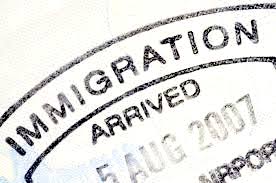 Stuart Anderson said, “The surest way to change the law in America is not by lobbying Congress but by convincing enough of the public the laws must be changed.” When talking about the immigration debate in politics, there seems to be many political pressures felt by policy makers to make the immigration policies we see today. Political pressures that cause policy, however, are different for every country because of geographical location, wealth, and beliefs and values. For example, in 1924, the United States Congress was forced to establish the U.S. Border Patrol to catch illegal Hispanic immigrants who were trying to run across the border to the United States. This is an example of the United States’ geographic location causing policy change. Canada does not have an illegal immigration problem because it only boarders the United States, so they do not need to put a lot of political resources in containing illegal immigration.
Stuart Anderson said, “The surest way to change the law in America is not by lobbying Congress but by convincing enough of the public the laws must be changed.” When talking about the immigration debate in politics, there seems to be many political pressures felt by policy makers to make the immigration policies we see today. Political pressures that cause policy, however, are different for every country because of geographical location, wealth, and beliefs and values. For example, in 1924, the United States Congress was forced to establish the U.S. Border Patrol to catch illegal Hispanic immigrants who were trying to run across the border to the United States. This is an example of the United States’ geographic location causing policy change. Canada does not have an illegal immigration problem because it only boarders the United States, so they do not need to put a lot of political resources in containing illegal immigration.
Throughout the history of Immigration Policy in both the United States and Canada, we can see different political pressures that affected both immigration policy. The opposition towards immigration to Canada and the U.S. was borne mostly by the Chinese during the mid to late 19th century. Not only was immigration rising during the mid to late 19th century, but diversity in the immigration groups was also on the increase. There were still English, Irish, and Germans coming into the United States and Canada; however, new ethnic groups, like Hispanics and Asians, were taking advantage of the great opportunities that these countries offered. This brought about a sense of national identity to the already settled natives, and their distrust and dislike for different ethnic groups were becoming greater and greater as the threat of an ethnic takeover was a possibility. What the natives felt threatened by was the different traditions, values, and loyalties that the diverse immigrant population would bring to what the natives thought was an already great nation. There was even Protestant opposition towards the Catholics; however, there were already too many Catholics groups settled and not a big enough ratio of opposition towards them for legislation to be passed restricting Catholics. The Chinese came to the United States because of the gold rush and they were willing to work for lower wages than the natives. The natives did not feel like this was fair, so with extreme pressure from the West Coast and the Democratic party, the Republican Congress passed the Chinese Exclusion Act of 1882.